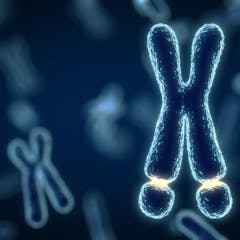
Articles on Genetic disease
Displaying 1 - 20 of 45 articles

No treatments are currently available to cure Parkinson’s disease. Better understanding the genetic foundation of this condition can help researchers find ways to slow or halt its progression.

Many evolutionary changes also come with costs.

Many people know someone with a genetic disease, but few understand how gene mutations work.

Fragile X syndrome is the most common inherited form of intellectual disability. Using short bits of DNA to fix improperly transcribed genes may one day be a potential treatment option.

Genetics expert Jean Bennett explains how gene therapy is being used to treat certain forms of inherited blindness.

Chemist David Liu explains how gene editing is paving the way to treating and even curing certain genetic diseases.

At the Third International Summit on Human Genome Editing, experts gather to discuss the path forward for CRISPR and other gene-editing technologies

FTD leads to changes in personality and behavior. Understanding its genetic and molecular causes could lead to new ways to treat neurodegenerative diseases.

Gene therapies and vaccines are often injected into muscle cells that are inefficient at producing desired proteins. Making them work more like liver cells could lead to better treatment outcomes.

For women with a family history of serious genetic disorders, abortion is a critical option: a security feature that allows them to consider having children.

New payment models may mean more of the people who need these treatments can get them.

Three pioneering technologies have forever altered how researchers do their work and promise to revolutionize medicine, from correcting genetic disorders to treating degenerative brain diseases.

The first full human genome was sequenced 20 years ago. Now, a project is underway to sequence 1 million genomes to better understand the complex relationship between genetics, diversity and disease.

Using ‘base editing’, researchers have cured progeria in mice. This genetic syndrome causes premature ageing in humans – those with the disease usually don’t live past the age of 13.

Recent studies using CRISPR to fast-track genetic studies into human disease genes appear flawed.

A rare type of inflammatory disease that causes repeated bouts of high temperatures can run in families. Here’s what we know so far.

Should Australia allow the creation of babies with DNA from more than two people? This reproductive technology could prevent babies being born with mitochondrial disease, so the simple answer is yes.

You might have heard of polycystic ovary syndrome, but what about polycystic kidney disease? This genetic disorder sees cysts growing in the kidneys.

Despite the fact that rare diseases aren’t actually so rare, it appears they suffer from a branding problem in Canada.

A Chinese scientist has revealed he edited the DNA of twin girls born through in vitro fertilization. These girls are designed to be resistant to HIV. Is the edit a medical necessity or an enhancement?
